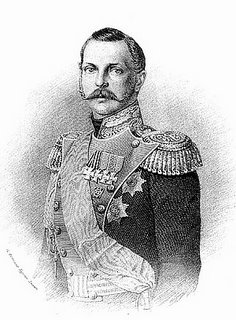
The Life of Tsar Alexander II, in some ways Russia's Lincoln, continues to generate interest in Moscow. Edward Radzinsky, a playwright and recent author of Alexander II: The Last Great Tsar, recently spoke about his book at a packed (1500-seat) Tchaikovsky Concert Hall. His appearance was recorded and replayed on TV for several days.
Tsar Alexander II ushered in many historical reforms for the Russian state. Most notably, he reenergized the economy by abolishing serfdom, introduced universal military training, created local councils (zemstvos) , and redirected foreign policy away from expansionism. However, he faced many assassination attempts and in April 1881, after safely escaping a bomb thrown at his carriage, was mortally wounded after attending to injuries suffered by his security detail by a previous bomb. Ironically, Alexander's assassins ruined any chance for deliberation on a liberal constitution, for which Alexander II was studiously attempting to deliver.
In June of this year, a monument to Alexander II was dedicated in Moscow near the cathedral of Christ the Savior. This article disparages Putin's negative reaction to the event, explaining how his repressive policies compare quite unfavorably with Alexander II (and Yeltsins as well). Very interesting. Of course, I learned in my graduate studies that repression in Russian history tends to zigzag- yes thats the term.
Perhaps the reason the Alexander's statue was dedicated has to do with the immediate return of Felix Dzerzhinsky's statue (despotic founder, KGB) to Moscow (among the first statues to be pulled down when the Soviet Union collapsed). Moscow Mayor Luzhkov can be credited with this kindly gesture. An interview with the Alfred Kokh, funding & idea originator for this statue explaining how why Alexander's statue is important today.

0 Comments:
Post a Comment
<< Home